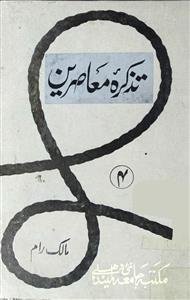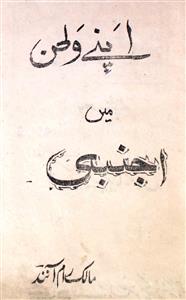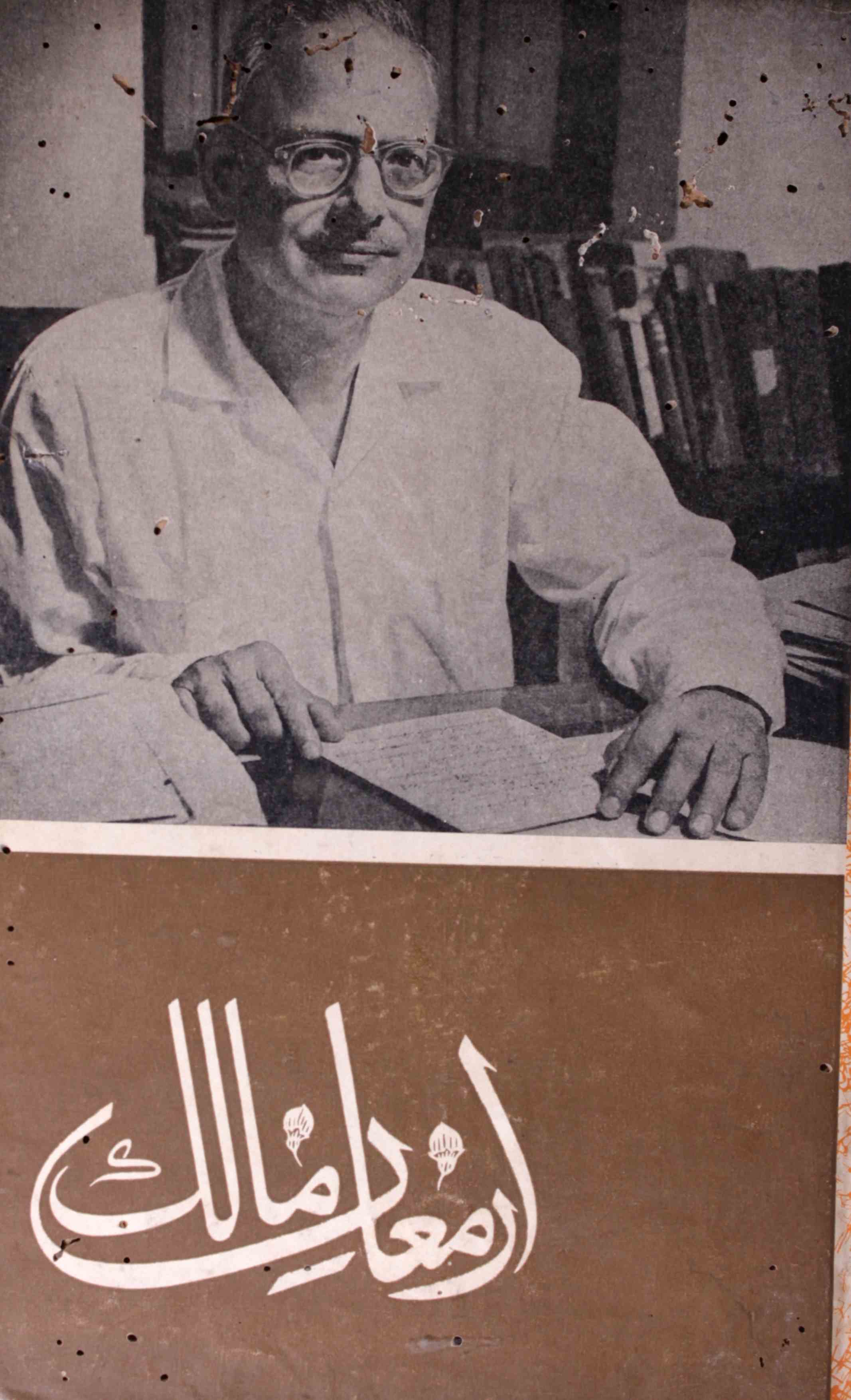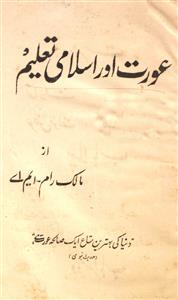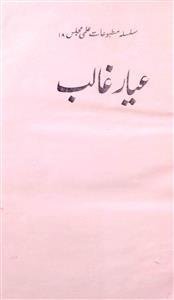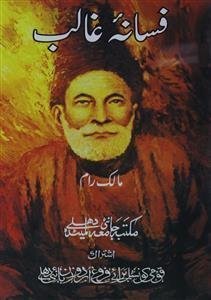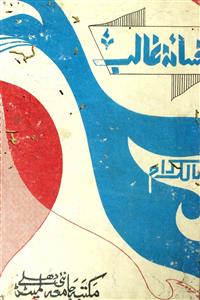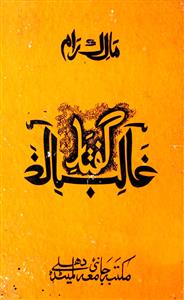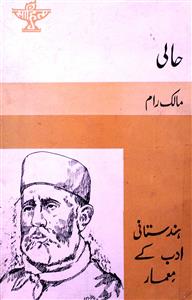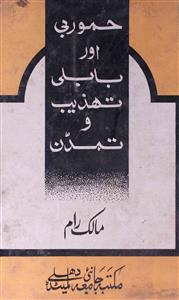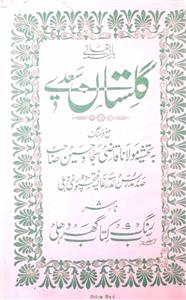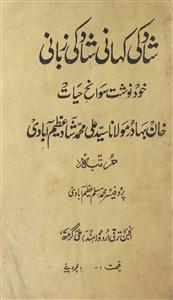 For any query/comment related to this ebook, please contact us at haidar.ali@rekhta.org
For any query/comment related to this ebook, please contact us at haidar.ali@rekhta.org
About The Book
اردو تحقیق کی روایت میں مالک رام کسی بھی تعارف کے محتاج نہیں ہیں۔ ان کا ایک نمایاں وصف ان کی غالب شناسی ہے۔ لیکن زیر نظر کتاب ان کے ایک تذکرے پر مبنی یے جو انہوں نے اپنے معاصرین پر قلمبند کیا تھا۔ یہ تذکرہ کل چار جلدوں میں ہے اور یہ اس کی تیسری جلد ہے جس میں انہوں 1974 اور 1975 میں وفات پانے والے ادبا کے حالات اور کلام کا ذکر کیا ہے۔ مالک رام کے یہ تذکرے کئی معنوں میں اردو کی ادبی تاریخ کا اہم جز ہیں جس میں انہوں نے الگ الگ ادوار کے ادبا، شعرا اور صحافیوں کے حالات شائع کیے ہیں۔ بیسویں صدی کے اردو ادب کے مؤرخین کے لیے یہ تذکرے انتہائی وقیع دستاویز کی حیثیت رکھتے ہیں۔
About The Author
Malik Ram's full name is Malik Ram Bernamia. He was born in 1906 in the town of Phalian, Gujarat district which is now part of Pakistan. In "Armughan-e-Malik", Syed Ali Jawad Zaidi has given the following insight about his date of birth:
“Malik Ram was born in December 1906. The exact date is difficult to determine, but family traditions and some other sources suggest that it may have been December 8 or 22. In both cases, the date of December 22 is a priority. It was mistakenly registered in the official papers on March 8, 1907 and has gained notoriety due to repetition of this error.”
Malik Ram's father's name was Lala Nihal Chand who was the youngest of the four brothers. He worked in the supply department and, during the war between the British and the Chinese, he went to China and stayed there for seven years. Nihal Chand was married to Bhagwan Devi, who belonged to village Suharo. She was a very lively woman. At the time of her husband's death, she had two young children, and was solely responsible for their education. When Malik Ram was twelve days old, his father contracted cholera, and Bhagwan Devi came to her mother’s house with her children. Thus Malik Ram's early education took place at Gurdwara Phalian, where he learned Garmkhi and Gurubani. At the age of six, he was admitted to Vernacular High School. He passed the middle school examination in 1920 and then entered the Diamond Jubilee School. In 1924, he passed he high school examination, and moved to Lahore for his intermediate in 1926. He completed his BA from Ivy College and then did his MA in History from Government College in 1930. Then he became associated with Knight College. He obtained LLB degree in 1933. Owning to his astute sense of learning, he also set up an association named Bazm-e-Adab, and held weekly meetings. At the same time, he wrote an article, "Zauq Aur Ghalib," which was published in Nigar. Soon his career as a journalist began, and he became associated with the magazine "Nairang-e-Khayal". He also issued a number dedicated to Allama Iqbal, and translated Abdul Rehman Bijnauri's English essays on "Israr-e-khudi" and "Ramuz-e-be-khudi" into Urdu and wrote footnotes on them. Allama Iqbal himself liked this particular issue and showered praises upon Malik Ram. In 1931, he married Vidyavati, with whom he had two sons and three daughters. They named their sons Aftab and Suleiman according to Muslim conventions. One daughter was named Bushra and the other daughters were named Aruna. In 1936 he came to Delhi in search of a livelihood. In 1939, he joined the Commerce Department of the Government of India. In 1939 he became Superintendent of the Indian Government Trade Office. When India became independent, he joined the Indian Foreign Service. As a result, they have been posted in Egypt, Iraq, Turkey, Belgium and many other places. He retired in 1965. He meticulously compiled the writings of Maulana Azad. Later, he formed a scholarly and literary association which he named "Ilmi Majlis".
Malik Ram died in 1993. He has received numerous awards, including the Sahitya Akademi Award. In 1986, he won the Dr. Zakir Hussain International Award for National Solidarity. Malik Ram was also appointed as the Vice Chancellor of Jamia Urdu and was also a member of Ghalib Academy and President of Anjuman Tarqi Urdu. In 1946, he became a member of the court of Aligarh Muslim University.
Malik Ram has the status of a researcher. He is especially considered as an expert of Ghalib studies. His most important works on Ghalib are "Zikr-e-Ghalib", "Fasana-e-Ghalib" and "Talamaz-ha-e-Ghalib". He also looked at Ghalib's biography through the eyes of a researcher and compiled it with great detail. Then, through a number of articles, he has made valuable contributions to our understanding of Ghalib.
Malik Ram also compiled "Ghubar-e-Khatir" and "Khutbat" which were published by Sahitya Academy.
 For any query/comment related to this ebook, please contact us at haidar.ali@rekhta.org
For any query/comment related to this ebook, please contact us at haidar.ali@rekhta.org
Write a Review
Jashn-e-Rekhta | 13-14-15 December 2024 - Jawaharlal Nehru Stadium , Gate No. 1, New Delhi
Get Tickets